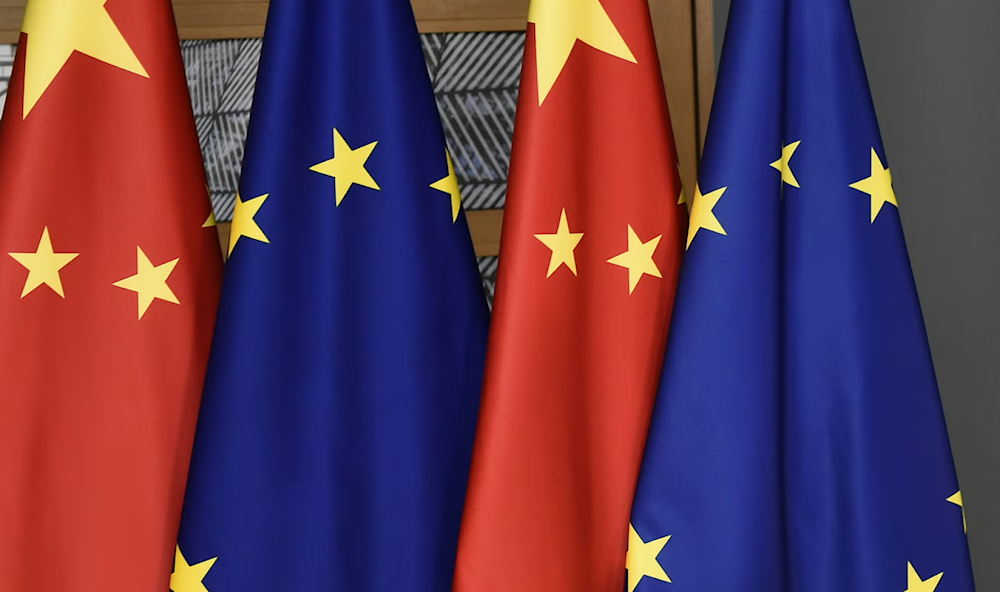China to lift sanctions on EU lawmakers in bid to restart trade talks
The stricter Trump becomes and the more tariffs he imposes, the closer China and the EU get despite their differences.
-

Chinese flags, far left, appear next to the European Union flags in this undated photo (AP)
China will lift sanctions on five current and former Members of the European Parliament (MEPs) critical of its human rights record, a senior Parliament official told POLITICO, potentially unlocking stalled EU-China trade talks.
European Parliament President Roberta Metsola is expected to inform party leaders in a closed-door meeting Wednesday, following confirmation last week that negotiations were in “their final stages.”
The sanctions, imposed in 2021, had led the Parliament to block diplomatic engagement with Beijing. Although MEPs remain vocal against China’s alleged rights abuses and economic policies, the move signals a shift in relations.
“We are very concerned about China's industrial policy that leads to market distortions and creates overcapacity that floods the world market,” said trade chief Bernd Lange.
French MEP Raphaël Glucksmann, one of those targeted, warned, “Facts do not change with lifting of sanctions.” He added, “We are talking about mass deportations, systematic forced labour, atrocities against the Uyghurs... and so many other grave human rights violations.”
Scope of the 2021 sanctions
In March 2021, the European Union imposed sanctions on Chinese officials and an entity over alleged human rights abuses in Xinjiang, marking the first EU punitive measures against China in over three decades. The sanctions targeted four senior Chinese officials and the Xinjiang Production and Construction Corps Public Security Bureau, freezing their assets and imposing travel bans within the EU. These measures were a response to allegations of mass detentions and other abuses against Uyghur Muslims in Xinjiang.
In response, China imposed sanctions on ten European individuals, including five Members of the European Parliament (MEPs), and four entities, including the European Parliament's subcommittee on human rights.
China, at the time, defended its actions as a legitimate response to what it received as the EU's interference in its internal affairs and emphasized that the investment agreement was "mutually beneficial" rather than a unilateral concession.
This followed the EU's imposition of sanctions on Chinese officials over alleged human rights violations in Xinjiang. At the time, the sanctions led the European Parliament to halt ratification of the EU-China Comprehensive Agreement on Investment (CAI), a deal aimed at improving market access and investment protections for EU companies in China.
As of April 2025, the EU-China Comprehensive Agreement on Investment (CAI) remains unratified, with the European Parliament maintaining its stance that ratification is contingent upon China lifting sanctions imposed on European lawmakers and entities. The CAI was finalized in December 2020 after seven years of negotiations.
Our statement on the sanctions imposed by China on ten European individuals and four European institutions, including MERICS. You can also find it on our websitehttps://t.co/CMmKPm0Pi5 pic.twitter.com/R6PtPSj8Ay
— MERICS (@merics_eu) March 22, 2021
The sanctioned Members of the European Parliament (MEPs) included Reinhard Bütikofer, Michael Gahler, Raphaël Glucksmann, Ilhan Kyuchyuk, and Miriam Lexmann, according to Euronews.
These sanctions prohibited the individuals and their families from entering mainland China, Hong Kong, and Macau and restricted associated companies and institutions from conducting business with China, according to POLITICO.
The four entities sanctioned were the Political and Security Committee of the Council of the European Union, the Subcommittee on Human Rights of the European Parliament, the Mercator Institute for China Studies (MERICS) in Germany, and the Alliance of Democracies Foundation in Denmark.

 3 Min Read
3 Min Read








